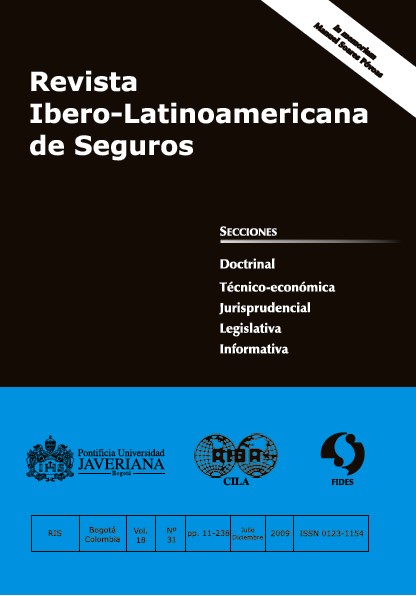Abstract
The purpose of this article is showing the convenience of incorporating tools into
the pension system in order to improve its equity, transparency and solvency which matches the tendency seen in some advanced countries aimed at using an actuarial methodology in the field of public management. In order to comply with the objective set out, this work explains and analyzes some aspects of notional defined contribution accounts (NDCs), actuarial balance (BA) and automatic adjustment financial mechanisms (MFAs). The main conclusion reached is that these tools are not mere theoretical concepts away from reality; they rather respond to the growing societal demand for transparency in the ambit of public finance management, to the desire of constantly pushing the system towards financial solvency at the long term and the aspiration of increasing the credibility of contributors and pension savers in the sense that promises of payment of pensions have reasonable expectations of being fulfilled. Likewise this work shows that the traditional methodological divergence between public finances and private finances has no sense and that the transplant of certain techniques of actuarial finances into management of public finances minimizes the political risk of the system when bringing the horizon of planning of politicians closer to the pension systems.
This journal is registered under a Creative Commons Attribution 4.0 International Public License. Thus, this work may be reproduced, distributed, and publicly shared in digital format, as long as the names of the authors and Pontificia Universidad Javeriana are acknowledged. Others are allowed to quote, adapt, transform, auto-archive, republish, and create based on this material, for any purpose (even commercial ones), provided the authorship is duly acknowledged, a link to the original work is provided, and it is specified if changes have been made. Pontificia Universidad Javeriana does not hold the rights of published works and the authors are solely responsible for the contents of their works; they keep the moral, intellectual, privacy, and publicity rights.
Approving the intervention of the work (review, copy-editing, translation, layout) and the following outreach, are granted through an use license and not through an assignment of rights. This means the journal and Pontificia Universidad Javeriana cannot be held responsible for any ethical malpractice by the authors. As a consequence of the protection granted by the use license, the journal is not required to publish recantations or modify information already published, unless the errata stems from the editorial management process. Publishing contents in this journal does not generate royalties for contributors.


